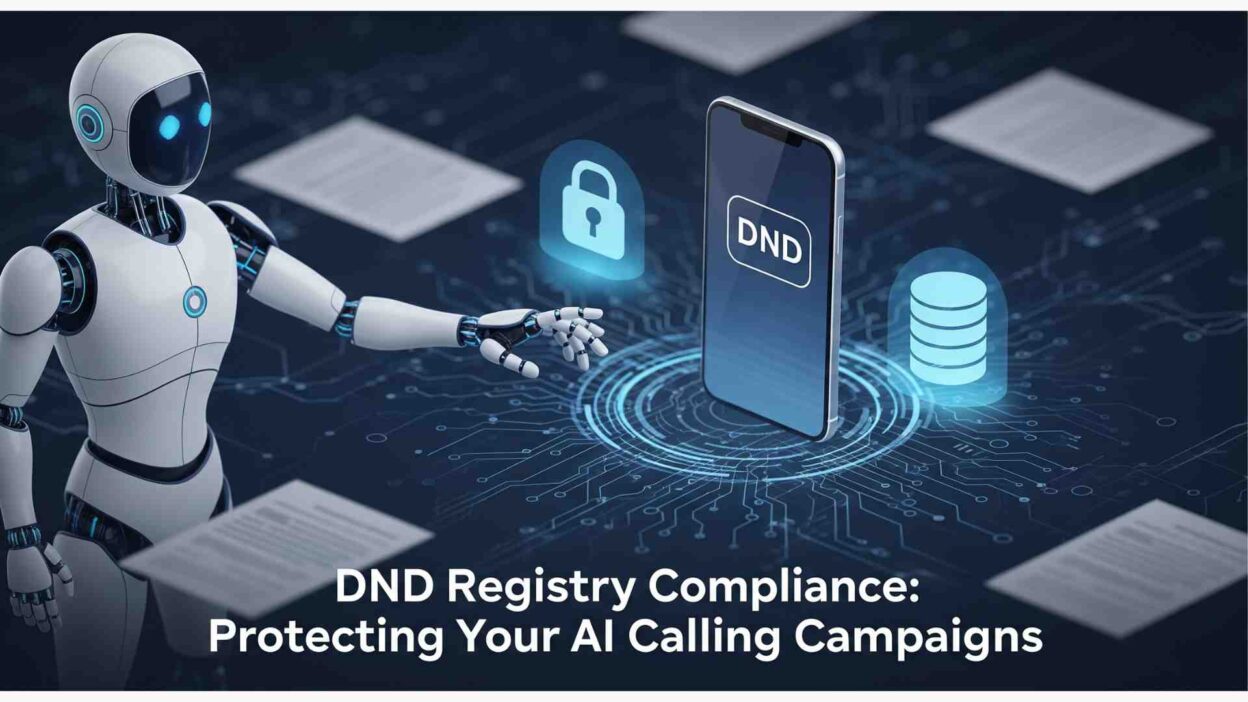TL;DR
DND registry compliance is the foundation of successful AI calling campaigns in today’s regulated telecommunications environment. Businesses must understand legal requirements before launching automated calling systems. Non-compliance can result in heavy fines and a damaged reputation. Your organization needs proper compliance strategies to protect both customers and business interests.
Table of Contents
Understanding DND Registry Compliance Basics
The Do Not Disturb (DND) registry protects consumers from unwanted promotional calls and messages. Telecom authorities maintain these registries to give customers control over marketing communications. Businesses must check these registries before making promotional calls. Registration on DND means customers have opted out of marketing communications.
AI calling systems must integrate with DND databases for real-time verification. This integration prevents calls to registered numbers. Companies face legal consequences for ignoring DND preferences. The system automatically filters out protected numbers from calling lists.
Legal Framework Behind DND Regulations
Telecommunications regulatory authorities enforce DND registry compliance through specific legal frameworks. These laws vary by country and region. India’s TRAI (Telecom Regulatory Authority of India) manages DND regulations strictly. The United States follows TCPA (Telephone Consumer Protection Act) guidelines.
Penalties for violations include monetary fines and service restrictions. Companies may face lawsuits from affected customers. Regulatory bodies can suspend calling privileges for repeat offenders. Legal costs often exceed the initial fine amounts.
Business Impact of Non-Compliance
DND registry compliance violations create significant business risks. Fines can range from thousands to millions of dollars. Customer trust erodes when businesses ignore privacy preferences. Brand reputation suffers from negative publicity.
Sales teams lose credibility with potential customers. Marketing campaigns become ineffective due to restricted reach. Legal departments spend resources on compliance issues instead of growth activities. Revenue declines as customer acquisition costs increase.
AI Calling Systems and DND Integration
Modern AI calling platforms include built-in DND registry compliance features. These systems automatically verify numbers against current DND databases. Real-time checking prevents accidental violations. Automated systems update DND status regularly.
Machine learning algorithms improve compliance accuracy over time. The system learns from regulatory updates and database changes. Error rates decrease as the AI processes more data. Compliance becomes more reliable with continuous system improvement.
Technical Architecture for Compliance
AI calling systems require robust technical infrastructure for DND registry compliance. Database integration connects directly with regulatory authority servers. API connections enable real-time number verification. Automated updates ensure current compliance status.
Data synchronization happens multiple times daily. The system maintains local compliance databases for faster checking. Backup systems prevent service disruption during maintenance. Technical redundancy ensures continuous compliance monitoring.
Implementation Best Practices
Successful DND registry compliance requires systematic implementation approaches. Start with comprehensive database integration testing. Verify all calling lists against current DND registries. Train staff on compliance procedures and requirements.
Create automated compliance reporting systems. Monitor calling activities for potential violations. Establish clear escalation procedures for compliance issues. Regular audits identify gaps in compliance processes.
Industry-Specific Compliance Requirements
Different industries face unique DND registry compliance challenges. Financial services have stricter regulations than retail businesses. Healthcare organizations must consider HIPAA alongside DND requirements. Educational institutions have specific student communication rules.
Banking and insurance companies need explicit customer consent for promotional calls. These industries face higher penalty risks for violations. Compliance teams must understand sector-specific requirements. Training programs should address industry-specific scenarios.
Telecommunications Sector Compliance
Telecom companies face the strictest DND registry compliance requirements. These businesses must obtain proper licensing for promotional calling. Regulatory oversight is intense for telecommunications providers. Compliance costs are higher for telecom companies.
Service providers must maintain detailed calling records. Audit requirements are more stringent for telecom businesses. Customer complaint handling procedures need regulatory approval. Compliance teams require specialized telecommunications training.
E-commerce and Retail Compliance
Online retailers use AI calling systems for customer service and promotions. DND registry compliance protects customer privacy preferences. E-commerce businesses must verify consent before promotional calls. Customer acquisition strategies must respect DND registrations.
Retail companies often have large customer databases requiring regular compliance checks. Seasonal campaigns increase compliance complexity. Cross-border operations face multiple regulatory requirements. Customer service calls may still be permitted despite DND registration.
Building Compliant AI Calling Strategies
Effective AI calling campaigns balance marketing goals with DND registry compliance. Customer segmentation helps identify permissible calling lists. Consent management systems track customer preferences accurately. Automated compliance checking prevents violations.
Personalization improves campaign effectiveness while respecting privacy. Customer journey mapping identifies appropriate calling opportunities. Timing optimization reduces customer annoyance. Message customization increases engagement rates.
Consent Management Systems
Customer consent forms the foundation of compliant AI calling campaigns. Explicit consent requirements vary by jurisdiction. Opt-in mechanisms must be clear and understandable. Consent withdrawal procedures should be simple and immediate.
Documentation proves customer consent during regulatory audits. Consent databases require regular updating and maintenance. Integration with DND systems ensures comprehensive compliance. Customer preference management reduces support burden.
Campaign Monitoring and Auditing
Continuous monitoring ensures ongoing DND registry compliance. Automated alert systems flag potential violations immediately. Regular audits identify compliance gaps and improvement opportunities. Performance metrics track compliance effectiveness.
Reporting systems provide regulatory authorities with required information. Compliance dashboards give management real-time visibility. Training programs address identified compliance weaknesses. Process improvements reduce violation risks.
Technology Solutions for DND Compliance
Advanced technology platforms simplify DND registry compliance management. Cloud-based solutions offer scalability and reliability. API integrations connect with multiple regulatory databases. Automated workflows reduce manual compliance tasks.
Real-time verification prevents calling DND-registered numbers. Machine learning improves compliance accuracy over time. Predictive analytics identify potential compliance risks. Integration capabilities connect with existing business systems.
Automated Compliance Verification
AI-powered compliance systems verify numbers against DND registries instantly. Automated processes reduce human error rates significantly. Real-time database updates maintain current compliance status. Bulk verification handles large calling lists efficiently.
System notifications alert teams to compliance issues immediately. Automated reporting generates regulatory compliance documentation. Error handling procedures manage database connectivity issues. Backup verification systems ensure continuous operation.
Compliance Reporting and Analytics
Comprehensive reporting systems track DND registry compliance performance. Analytics identify trends and improvement opportunities. Regulatory reports meet authority requirements automatically. Compliance metrics guide strategic decision-making.
Dashboard visualizations provide clear compliance status overviews. Automated alerts notify teams of potential violations. Historical data supports compliance trend analysis. Customizable reports meet specific business requirements.
Best Practices for Long-Term Compliance
Sustainable DND registry compliance requires systematic approaches and continuous improvement. Regular training keeps teams updated on regulatory changes. Policy updates reflect new compliance requirements. Process documentation ensures consistent implementation.
Vendor selection criteria should include compliance capabilities. Technology upgrades must maintain compliance standards. Regular reviews identify improvement opportunities. Compliance culture development reduces violation risks.
Training and Education Programs
Comprehensive training programs ensure team compliance awareness. Regular updates address regulatory changes promptly. Role-specific training focuses on relevant compliance aspects. Certification programs validate compliance knowledge.
New employee orientation includes compliance fundamentals. Ongoing education maintains compliance expertise. External training resources provide specialized knowledge. Compliance champions promote best practices organization-wide.
Continuous Improvement Processes
Regular compliance assessments identify improvement opportunities. Feedback systems capture compliance challenges and solutions. Process optimization reduces compliance burden. Technology upgrades improve compliance effectiveness.
Benchmarking against industry standards guides improvement efforts. Compliance metrics track performance trends over time. Root cause analysis prevents recurring violations. Innovation initiatives explore new compliance solutions.
Future of DND Registry Compliance
Regulatory environments continue evolving with technological advancement. AI calling systems must adapt to changing compliance requirements. Cross-border regulations create complex compliance challenges. Technology solutions must scale with regulatory complexity.
Emerging technologies like blockchain may enhance compliance verification. Artificial intelligence will improve compliance automation. Predictive analytics will identify compliance risks earlier. Integration capabilities will expand across platforms.
Regulatory Trends and Changes
Global regulations increasingly focus on consumer privacy protection. DND registry compliance requirements become more stringent. Cross-border data protection laws affect calling campaigns. Technology companies face higher compliance expectations.
Regulatory authorities enhance enforcement capabilities. Penalties for violations increase substantially. Consumer awareness drives stricter compliance demands. Industry self-regulation initiatives supplement legal requirements.
Technology Evolution Impact
Advanced AI systems will revolutionize DND registry compliance management. Machine learning will predict compliance risks more accurately. Automated systems will reduce manual compliance tasks. Integration capabilities will expand across business systems.
Blockchain technology may enhance compliance verification processes. Real-time compliance monitoring will become standard. Predictive analytics will identify potential violations early. Cloud-based solutions will improve scalability and reliability.
Read More: Voice Bot Escalation Protocols: AI Transfers To Human Agents
Conclusion

DND registry compliance remains essential for successful AI calling campaigns. Businesses must prioritize compliance to protect customers and avoid penalties. Technology solutions simplify compliance management significantly. Continuous improvement ensures long-term compliance success.
Investment in proper compliance systems protects business interests. Customer trust depends on respecting privacy preferences. Regulatory compliance creates competitive advantages. Effective compliance strategies support sustainable business growth.
Organizations that embrace comprehensive DND registry compliance will thrive in regulated environments. Technology partnerships provide expertise and reliability. Compliance culture development ensures consistent implementation. Future success depends on proactive compliance management.






[…] B2B voice AI compliance has become a critical concern for businesses implementing conversational AI systems. Companies must navigate complex regulatory frameworks to protect customer data. Voice AI systems process sensitive personal information daily. Compliance failures can result in massive fines and reputation damage. […]
[…] Voice AI security and privacy compliance requires secure data processing architectures. Audio data flows through encrypted pipelines from collection to analysis. Secure processing environments prevent unauthorized data access during analysis. […]